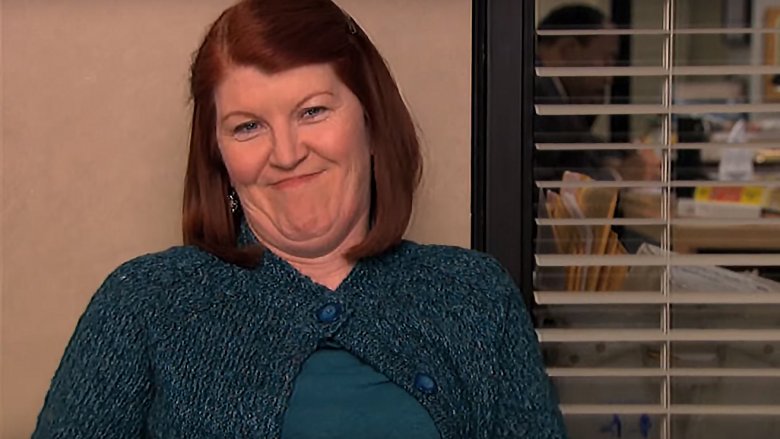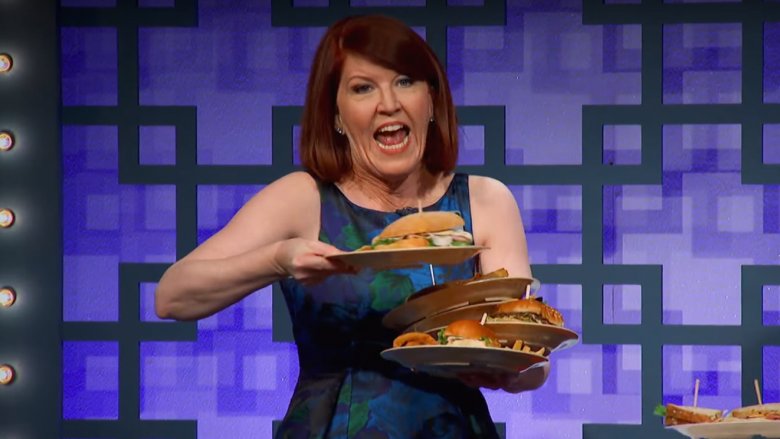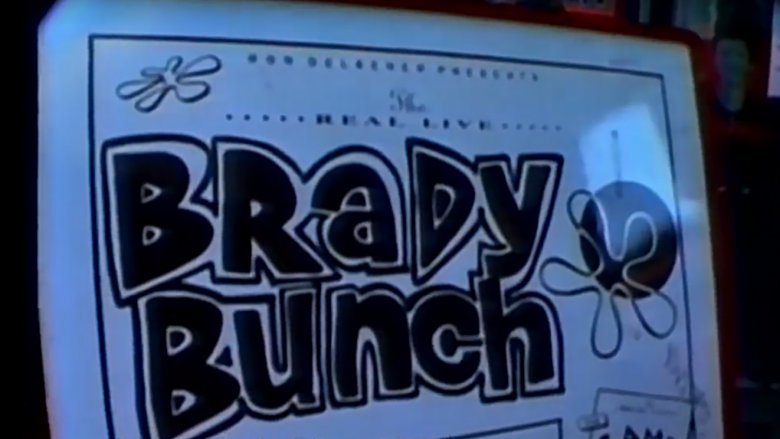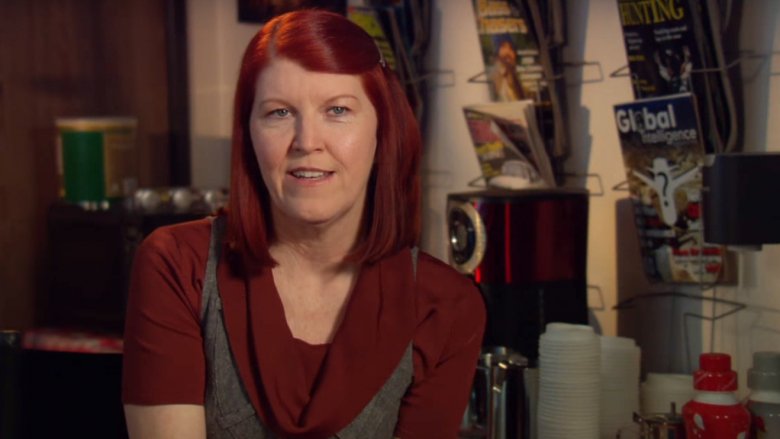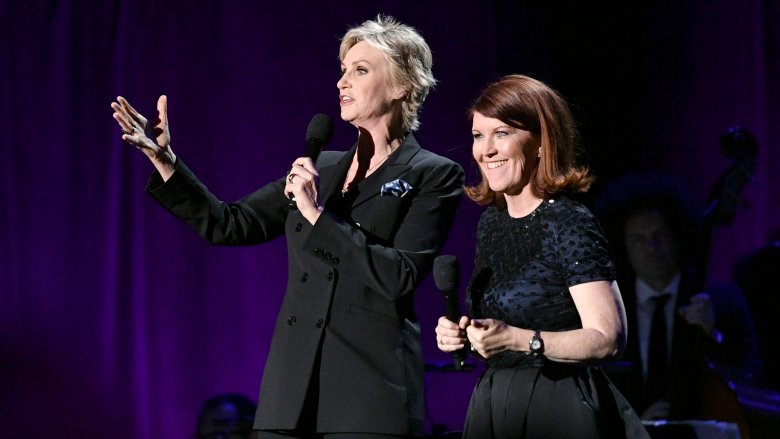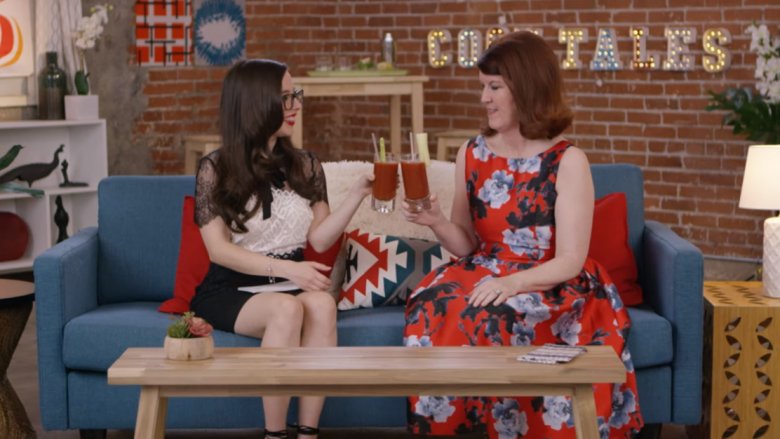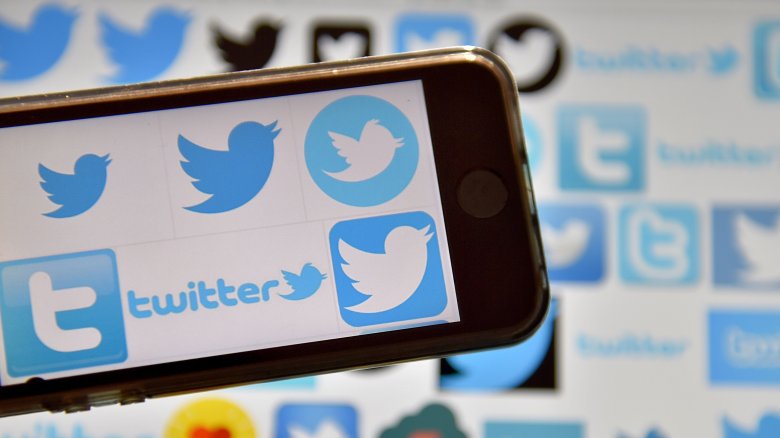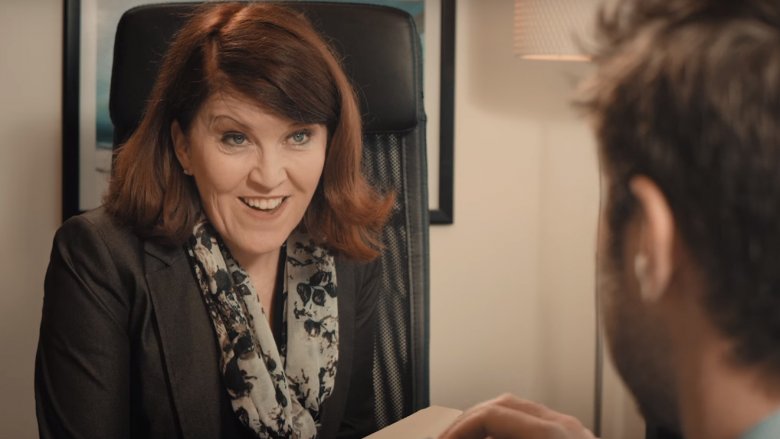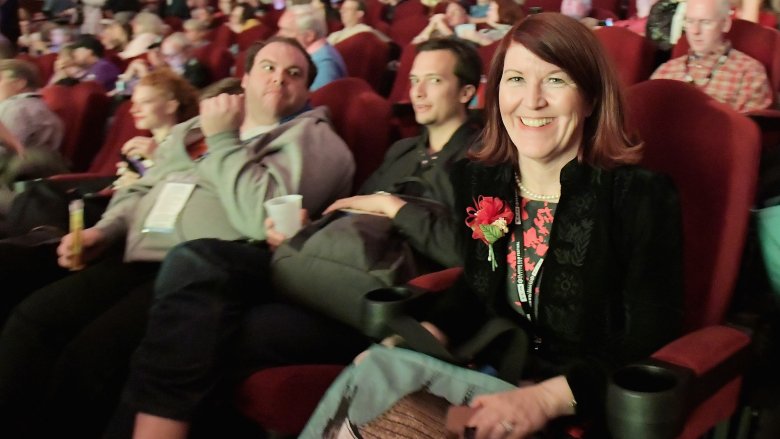Whatever Happened To Meredith From The Office?
For 201 episodes over nine seasons, fans of The Office got to see Kate Flannery play Meredith Palmer, the boozy, promiscuous supplier relations representative at Dunder Mifflin Paper Company, Inc. One of the show's great many pleasures came from the way it gradual revealed bits of Meredith's past — her failed marriages, lactose intolerance, and prior occupations, among which were "boxer" and "adult film star."
Flannery came to The Office with a nearly 20-year résumé in improvisational comedy and theater, having cut her proverbial teeth in one of the most prestigious improv companies in the country, and toured with a terrifically popular theatrical comedy. She exited The Office at its conclusion with years of hilarious scenes and verbal exchanges, having created and embodied one of the funniest secondary characters on television. What has she done since? Not one to sit still for long, Flannery has been quite busy. Let's see what she's been up to.
Before Meredith, she was in Chicago improv
Flannery's career began an upward path in 1991, when she got involved with the most famous improvisational theater company in Chicago, The Second City. "When you first get to Second City, you really start at the bottom," she told The Road to Cinema podcast. "When you start, you have to tour, but one Monday a month your company gets to do its show at [the main theater]. But it's a Monday; it's like an off-school night, so the people that come know that they're not seeing the main stage show."
At the same time she was on the bottom rung at Second City, Flannery also established herself as one of the founding members of Chicago's Annoyance Theater, an improv ensemble and performance space. There, she worked with Jill Soloway, who would later make a name for herself on Six Feet Under and Transparent. "Jill had so much energy and so much imagination," Flannery told The Road to Cinema, "and people really noticed what she was doing, even though we were in this, like, kind of seedy, ex-drag club with folding chairs." One of their plays, a feminist comedy called The Miss Vagina Pageant, caught the attention of Saturday Night Live producer Lorne Michaels, who was recruiting for the show's cast. "Four of the six of us [in the play] were under consideration for SNL ... I just remember it began to feel like a real pageant because we were vying for the next spot [on SNL]. It's so weird to compete against your friends."
She was also a 'real live' Brady
One of the Annoyance Theater's biggest hits was a show called The Real Live Brady Bunch, an irony-filled replaying of actual Brady Bunch episodes, with Annoyance players in roles made famous by the likes of Robert Reed and Florence Henderson. "It was like a rock 'n' roll show," Flannery told the Improv Nerd podcast. "People were literally lined up for blocks in freezing cold weather [to see the show]. It was a weird time; it was what I call 'pre-YouTube theater,' because no one could share things like we do with the internet [today]. You can't show somebody clips, so we were doing it — that was the way that we shared it."
Flannery joined the touring cast of the show, performing in theaters across the country. On one such tour, the troupe presented the "Getting Davy Jones" episode, with the former Monkee himself reprising his role in the show. Flannery and Jones had a short-lived affair while the company was on the road, which she described in an essay on the Fresh Yarn blog. "A person doesn't have dinner with Davy Jones without realizing he does not belong to anyone," she told the pop culture site Hobo Trashcan. "He belongs to the world. He could have had dinner with any woman in the world, but he chose to eat with me ... sometimes. It was just a couple of weeks. It was a very quick learning experience, let me say."
She was okay closing up The Office
After nine seasons, The Office left the air on a high note, with the wedding of two main characters, Dwight and Angela — a send-off that sat well with Flannery. "I am so proud of the ending of The Office," she told the blog How to Be a Redhead. "I felt that everything was wrapped up so nicely. It was sad and funny and thoughtful and everything you want in a finale. The process of shooting the end was so terrific. We shot at Big Sky Ranch for the wedding scenes — an epic, beautiful space that felt like a dream. ... I am so sad, but I am so proud. It's a great feeling to be a part of such a respected and honored project. A very rare thing in life."
The show's end also made Flannery nostalgic and reflective, which she discussed in an essay she wrote for Huffington Post. "To be a part of an ensemble on TV is a gift," she noted. "I stopped counting lines. I was disappointed at first when my lines would get cut but it dawned on me — I don't need to be the meat. I don't need to be the side dish. I can be the onions. It's good to be the onions. Tasty. ... Abraham Lincoln said most people are as happy as they make up their minds to be ... although some don't consider actors to be people. This show made its mind up to have heart and soul and treat the audience like it had a brain."
She became a Lampshade
Flannery gets to flex her musical muscles in the comedy lounge act the Lampshades, which she describes as "a male/ female duo fresh from the cruise ship circuit, spinning pop and rock into comedy gold as they work out the kinks in their amusingly tortured relationship." Of the act's origins, Flannery (who studied musical theater and voice) recalls, "I originally developed the Lampshades when I was in Chicago with a guy named Scot Robinson and Dave Adler was our piano player. I guess we did it for almost two years there, but we were doing other shows at the same time, so it wasn't our main focus or anything. And then, we didn't live in the same city together for a long time, then found ourselves both living in L.A. about six years ago and we decided to do it again."
The duo plays regularly, mostly in southern California comedy clubs, and for a number of years had a standing gig at the Improv Olympic Theater in Hollywood. "It's been musically interesting," she says. "We will gig out and host stand-up nights and we've done a lot of charity events and some private parties. It's a very portable show, so it's been really, really great for us. We've gotten around a lot doing it and we've met a lot of people because of it."
She's Jane Lynch's sidekick
In addition to the Lampshades, Flannery sings and engages in witty onstage repartee with Jane Lynch (Glee, Best in Show, A Mighty Wind), in Lynch's comedy cabaret show See Jane Sing. The pair's working relationship goes back to the early days of The Real Live Brady Bunch, when Flannery served as Lynch's understudy and acted in several of the play's non-Brady roles. While much of See Jane Sing seems to be improvised, Lynch says it simply isn't the case. "I like to script every damn moment," Lynch told Google in a joint interview with Flannery. "I build a cage, but then I bounce around freely within the cage. I need to know that I've got that structure. Even my hilarious patter that sounds like it's 'off the top of my head,' I've scripted within an inch of its life, but then I do bounce around within that. But [Kate] is loosey-goosey. Nothing's the same twice for her. And that keeps me alive and [thinking] 'What is she going to do now?'"
For Flannery, performing with Lynch enables her to rekindle her love of music. "My dad had a bar," she explained in the same interview. "He had a jukebox and if a patron didn't know a song, he'd say, 'You don't know that song?' And I remember him challenging me to learn songs, and I loved old music. Back then, it was the way we connected ... When my dad came to see the show, he just plugged right in."
She's the mom of the '4th Man Out'
A film Variety called a "thoroughly ingratiating, touchingly heartfelt comedy," 4th Man Out tells the story of Adam, a small-town car mechanic who, after a night of drinking, comes out to his three lifelong friends, who are surprised to learn he is gay. The bulk of the film deals with maintaining the equilibrium in their friendship and helping Adam find a relationship. Flannery plays Adam's mother, Karen, and says the film is a product of an increasingly tolerant audience and society.
"The world has changed so much," she told Hollywood Chicago in an interview with the film's cast, "and younger kids have so much less judgement about everything — about coming out, about the transgender community, about racial issues — they don't care to draw lines between people. I think that is fantastic, and this movie is the evolution of coming out in America. This is an amazing story that represents that change." Parker Young, who plays one of Adam's friends in the film, concurs. "It's one of those things that in the end, is the right thing to do," he told Hollywood Chicago, "and as time progresses, the right thing always emerges as what we need to do. Our generation is more aware of what we think about it as individuals, and we're not listening to negative backlash when we don't agree with it."
She gives questionable advice on sex ... and kissing glass
Flannery has, since her time on The Office, given many interviews, but none as odd or as mildly dirty as when she sat down with comedian Esther Povitsky (in character as "Little Esther") on the YouTube video series Cocktales, a three-minute episode containing much tongue-in-cheek banter about sex and relationships. Povitsky begins the interview by asking Flannery whether the items in a list she recites are turn-ons or turn-offs: young Matt Dillon ("Yes, turn-on. Yes."); old Matt Dillon ("Meh."); Piñatas ("Turn on. I love to bat the s*** out of something."). Povitsky then asks Flannery who gave her her adolescent "sex talk," to which Flannery replies, "My father, sort of. One time my father gave me some random speech, and he said, 'Keep going to church; none of that casting couch crap.' That was as close as we came to talking about sex."
Povitsky then stands and asks Flannery to yell catcalls at her, but ones that describe her inner beauty. Flannery plays along, shouting, "You have a high intellect! You are very sensitive! You seem like a very nice person!" The show ends with Povitsky holding up a clear glass pane and asking for "pointers on my kissing," before proceeding to exaggeratedly kiss the glass. "You need to be much harder with your upper lip and much softer with your lower lip," Flannery instructs, before demonstrating on her own glass plane.
It's a fun — and funny — episode, and one can see how Flannery's training in improvisational comedy comes in handy.
She's on social media (sometimes reluctantly)
Flannery maintains a robust presence on Twitter and Instagram, tweeting and posting photos of her exploits offstage, with friends and other celebrities, and of current and upcoming projects. She is also fond of retweeting fans' posts and a seemingly endless stream of memes, both of The Office in general, and of her character Meredith specifically.
She doesn't always feel comfortable in the virtual realm, though. In an interview with Google, Flannery noted that engaging with fans online "is kind of horrifying. I have to be more self-conscious than I normally would be. And I have to figure out who needs to know what, and also who gives a flying s***?" One specific online project illustrates her discomfort. "I remember doing a celebrity blog [about] The Office, for TVGuide.com," she recalls, "and I remember someone did it before me who was like, 'We all had raisins today!' They were saying the dumbest things. I felt like I needed to have a point of view. For me I feel like sometimes there's such an egocentric thing that happens with this sense of celebrity, even at the smallest level. But we're all sort of negotiating your ability to stick around. It's a really slippery slope."
She's 'Stuck' in a 'Fishbowl' in an 'Institute for the Abnormally Bizarre'
In the years since Dunder Mifflin closed for good, Flannery has filled her onscreen time with many projects, most of them independently produced films and television shows. She plays the role of Ms. Jenkins, nosy next-door neighbor, in Stuck, in which the main character, Darby (Heather Matarazzo) is sentenced to a month of house arrest in the same house her with ex-boyfriend and his new fiancee. Flannery also has a part in Fishbowl, California, a film about a drunk, chronically ill widow who takes in an aimless twentysomething (Flannery plays a potential employer who rejects said twentysomething during a job interview). She co-stars in Captain Karl's Institute for the Abnormally Bizarre, a fledgling television series that the Hollywood Reporter calls "a workplace horror-comedy that will follow what happens when Captain Karl is mysteriously found dead." Finally, Flannery will play Principal Saperstein in the Hulu comedy series All Night, which Deadline describes as centering "on an overnight, lock-in graduation party in which a group of new grads will do whatever it takes to make their remaining high school dreams come true."
While none have yet been an Office-sized hit, each has benefited from Flannery's wit and comedic chops. Considering the current pace at which she's working, it's safe to assume that there will be more projects to add to this list in short order.
She hosted the TCM Classic Film Festival
Flannery — a major film buff, as many actors are — hosted a screening of Billy Wilder's Oscar-winning 1945 film The Lost Weekend at the 2018 TCM Classic Film Festival. The movie was, according to TCM, the first time a Hollywood production had seriously dealt with alcoholism. Based on a novel by Charles R. Jackson, The Lost Weekend is the tale of a writer (played by Ray Milland) who is debilitated by alcohol and willing to sacrifice everything — even the love of his girlfriend (Jane Wyman) and the help of his brother (Phillip Terry) — to keep drinking.
Flannery's father owned a bar (though he had stopped drinking by the time she was born), so ostensibly she had seen patrons who couldn't quite put the bottle down. Her connections to the film ran even deeper; in an interview outside the festival, she said she accepted the gig presenting the film "because I played an alcoholic on television and I used to wait on Billy Wilder for about seven years in a restaurant in Beverly Hills." This bit of access to the great filmmaker stuck with her. "He was lovely," she recalled. "I'm sure he couldn't pick me out of a lineup, but I was always inspired and moved by just seeing him and his amazing body of work. He was lovely. He was terrific. He had a martini, calves brains and eggs and a slice of apple pie, every time. He was very consistent, which is kind of fantastic. We should all be so consistent."
